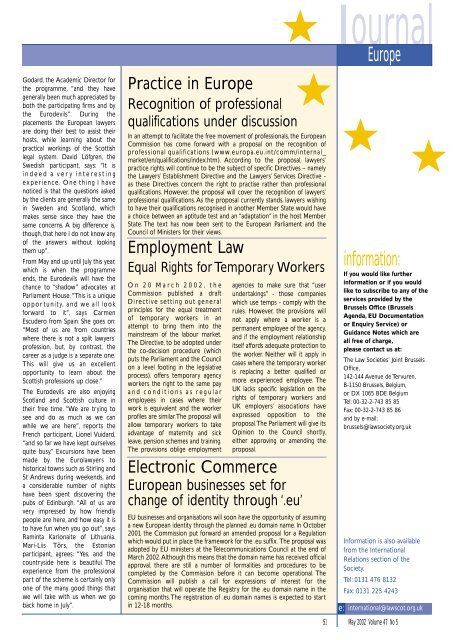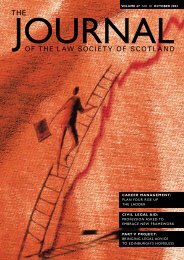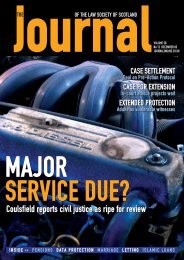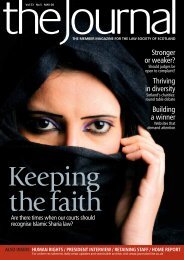OF THE LAW SOCIETY OF SCOTLAND - The Journal Online
OF THE LAW SOCIETY OF SCOTLAND - The Journal Online
OF THE LAW SOCIETY OF SCOTLAND - The Journal Online
Create successful ePaper yourself
Turn your PDF publications into a flip-book with our unique Google optimized e-Paper software.
Godard, the Academic Director for<br />
the programme, “and they have<br />
generally been much appreciated by<br />
both the participating firms and by<br />
the Eurodevils”. During the<br />
placements the European lawyers<br />
are doing their best to assist their<br />
hosts, while learning about the<br />
practical workings of the Scottish<br />
legal system. David Löfgren, the<br />
Swedish participant, says: “It is<br />
indeed a very interesting<br />
experience. One thing I have<br />
noticed is that the questions asked<br />
by the clients are generally the same<br />
in Sweden and Scotland, which<br />
makes sense since they have the<br />
same concerns. A big difference is,<br />
though, that here I do not know any<br />
of the answers without looking<br />
them up”.<br />
From May and up until July this year,<br />
which is when the programme<br />
ends, the Eurodevils will have the<br />
chance to “shadow” advocates at<br />
Parliament House.“This is a unique<br />
opportunity, and we all look<br />
forward to it”, says Carmen<br />
Escudero from Spain. She goes on:<br />
“Most of us are from countries<br />
where there is not a split lawyers’<br />
profession, but, by contrast, the<br />
career as a judge is a separate one.<br />
This will give us an excellent<br />
opportunity to learn about the<br />
Scottish professions up close.”<br />
<strong>The</strong> Eurodevils are also enjoying<br />
Scotland and Scottish culture in<br />
their free time. “We are trying to<br />
see and do as much as we can<br />
while we are here”, reports the<br />
French participant, Lionel Vuidard,<br />
“and so far we have kept ourselves<br />
quite busy.” Excursions have been<br />
made by the Eurolawyers to<br />
historical towns such as Stirling and<br />
St Andrews during weekends, and<br />
a considerable number of nights<br />
have been spent discovering the<br />
pubs of Edinburgh. “All of us are<br />
very impressed by how friendly<br />
people are here, and how easy it is<br />
to have fun when you go out”, says<br />
Raminta Karlonaite of Lithuania.<br />
Mari-Liis Tõrs, the Estonian<br />
participant, agrees: “Yes, and the<br />
countryside here is beautiful. <strong>The</strong><br />
experience from the professional<br />
part of the scheme is certainly only<br />
one of the many good things that<br />
we will take with us when we go<br />
back home in July”.<br />
Practice in Europe<br />
Recognition of professional<br />
qualifications under discussion<br />
In an attempt to facilitate the free movement of professionals, the European<br />
Commission has come forward with a proposal on the recognition of<br />
professional qualifications (www.europa.eu.int/comm/internal_<br />
market/en/qualifications/index.htm). According to the proposal, lawyers’<br />
practice rights will continue to be the subject of specific Directives – namely<br />
the Lawyers’ Establishment Directive and the Lawyers’ Services Directive -<br />
as these Directives concern the right to practise rather than professional<br />
qualifications. However, the proposal will cover the recognition of lawyers’<br />
professional qualifications. As the proposal currently stands, lawyers wishing<br />
to have their qualifications recognised in another Member State would have<br />
a choice between an aptitude test and an “adaptation” in the host Member<br />
State. <strong>The</strong> text has now been sent to the European Parliament and the<br />
Council of Ministers for their views.<br />
Employment Law<br />
Equal Rights for Temporary Workers<br />
On 20 March 2002, the<br />
Commission published a draft<br />
Directive setting out general<br />
principles for the equal treatment<br />
of temporary workers in an<br />
attempt to bring them into the<br />
mainstream of the labour market.<br />
<strong>The</strong> Directive, to be adopted under<br />
the co-decision procedure (which<br />
puts the Parliament and the Council<br />
on a level footing in the legislative<br />
process), offers temporary agency<br />
workers the right to the same pay<br />
and conditions as regular<br />
employees in cases where their<br />
work is equivalent and the worker<br />
profiles are similar.<strong>The</strong> proposal will<br />
allow temporary workers to take<br />
advantage of maternity and sick<br />
leave, pension schemes and training.<br />
<strong>The</strong> provisions oblige employment<br />
agencies to make sure that “user<br />
undertakings” - those companies<br />
which use temps - comply with the<br />
rules. However, the provisions will<br />
not apply where a worker is a<br />
permanent employee of the agency,<br />
and if the employment relationship<br />
itself affords adequate protection to<br />
the worker. Neither will it apply in<br />
cases where the temporary worker<br />
is replacing a better qualified or<br />
more experienced employee. <strong>The</strong><br />
UK lacks specific legislation on the<br />
rights of temporary workers and<br />
UK employers’ associations have<br />
expressed opposition to the<br />
proposal.<strong>The</strong> Parliament will give its<br />
Opinion to the Council shortly,<br />
either approving or amending the<br />
proposal.<br />
Electronic Commerce<br />
European businesses set for<br />
change of identity through ‘.eu’<br />
EU businesses and organisations will soon have the opportunity of assuming<br />
a new European identity through the planned .eu domain name. In October<br />
2001 the Commission put forward an amended proposal for a Regulation<br />
which would put in place the framework for the .eu suffix. <strong>The</strong> proposal was<br />
adopted by EU ministers at the Telecommunications Council at the end of<br />
March 2002.Although this means that the domain name has received official<br />
approval, there are still a number of formalities and procedures to be<br />
completed by the Commission before it can become operational. <strong>The</strong><br />
Commission will publish a call for expressions of interest for the<br />
organisation that will operate the Registry for the .eu domain name in the<br />
coming months.<strong>The</strong> registration of .eu domain names is expected to start<br />
in 12-18 months.<br />
<strong>Journal</strong><br />
Europe<br />
information:<br />
If you would like further<br />
information or if you would<br />
like to subscribe to any of the<br />
services provided by the<br />
Brussels Office (Brussels<br />
Agenda, EU Documentation<br />
or Enquiry Service) or<br />
Guidance Notes which are<br />
all free of charge,<br />
please contact us at:<br />
<strong>The</strong> Law Societies’ Joint Brussels<br />
Office,<br />
142-144 Avenue de Tervuren,<br />
B-1150 Brussels, Belgium,<br />
or DX 1065 BDE Belgium<br />
Tel: 00-32-2-743 85 85<br />
Fax: 00-32-2-743 85 86<br />
and by e-mail:<br />
brussels@lawsociety.org.uk<br />
Information is also available<br />
from the International<br />
Relations section of the<br />
Society.<br />
Tel: 0131 476 8132<br />
Fax: 0131 225 4243<br />
e:<br />
international@lawscot.org.uk<br />
51 May 2002 Volume 47 No 5










